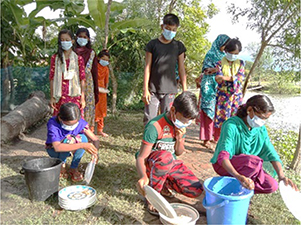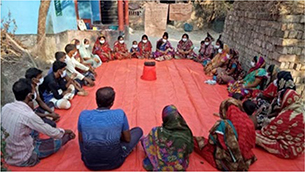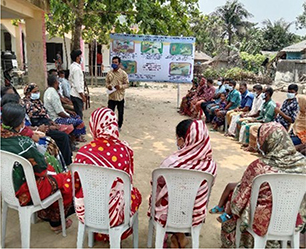
VYAs learning about the benefits of working together. Photo credit: Shomuel Sangma (September 9, 2021).
FIELD REPORT
Kohima Daringa, Nancy TenBroekb, Shagota Chisimc, Carolyn O'Briend, Mona Bormete, Meroji Sebanyf, Kaitlyn Slateg
a MA, Senior Country Director, World Renew Bangladesh
b MA, Senior Program Consultant, World Renew Bangladesh
c MSS, Capacity Development Manager, World Renew Bangladesh
d MSPH (International Health), Program Advisor, USAID’s MOMENTUM Country and Global Leadership, Christian
e MPH, Program Director, USAID’s MOMENTUM Country and Global Leadership, Christian Connections for International Health
f MPH, Adolescent and Youth Health Specialist, USAID’s MOMENTUM Country and Global
g M.A., Director, Program Excellence, World Renew, Byron Center, Michigan, US
Key words: Momentum Global Health, CCIH, World Renew, Local Partner Faith in Action, USAID
Amena (full name withheld to protect privacy), a 15-year-old girl from a remote village in Satkhira District of Bangladesh, escaped a forced marriage at the age of 13 and is now continuing with her studies. She gained the confidence to say “no” to early marriage through a Very Young Adolescent (VYA) program for 10–14-year-olds run by faith-based organizations World Renew and its local partner Faith in Action (FIA) with funding from USAID’s MOMENTUM Country and Global Leadership project in 2021 - 2022. With the confidence and skills she learned through the VYA program, she spoke to her parents about her concerns and dreams and garnered community support to stop her marriage. Amena is among many very young adolescents who benefited from this program.
Satkhira District has a high prevalence of child marriage. According to the 2019 Multiple Indicator Cluster Survey (MICS) in Bangladesh, 42.8% of girls aged 15-19 years are married.1 The situation is similar across the country with 22% of girls getting married before the age of 15.2 Bangladesh has the highest proportion of girls becoming mothers during adolescence in the world outside Sub-Saharan Africa with 48% entering motherhood before turning 20.3 One girls’ school in the Satkhira district reported 66 of 460 students were forced to marry by their parents during the COVID-19 pandemic as the families lost their source of income due to lockdown imposed by the government. Because of this, many of the married girls will find it difficult to return to school due to their new responsibilities.
Gender inequality is deeply rooted in the patriarchal social context of Bangladesh where social and gender norms limit adolescent girls’ autonomy and decision making, knowledge about their reproductive health, and access to health services.4 Thus, it is important to intervene early before gendered behaviors, attitudes, and norms are solidified. Early adolescence is a critical window of opportunity to work with girls, families, and others who influence decision-making to shift the trajectory of the VYA life course to improve gender attitudes, behaviors, and norms before firmly entrenched and improve social and emotional development and health outcomes.5
World Renew is motivated by Micah 6:8 to do justice, love mercy, and walk humbly with God. This has informed their work in Bangladesh since 1975 and is the motivation to work with VYAs and communities to help them build capacity to experience freedom from poverty and injustices and flourish in the fullness of life.
World Renew Bangladesh works with five local partner organizations in over 700 villages, supporting 29 People’s Institutions (apex bodies of village self-help groups are the higher level leadership body above self-help groups that provide leadership at the government level) and 1,500 primary groups. World Renew Bangladesh works with local men, women, adolescents, and children for community engagement, leadership building, and capacity development in food security, economic opportunities, and health. World Renew Bangladesh helps communities develop local structures to ensure the communities can sustain gains made through the work.
Faith-based organizations (FBOs) are located closest to multicultural and multireligious communities with significant access to and influence over adolescents and youth, particularly VYAs. However, many FBOs like World Renew are not fully equipped with the knowledge, skills, and resources to promote positive health and development among VYAs, their families, and their communities. World Renew has ongoing projects with older adolescents but needed support with delivering tailored programming for VYAs.
In response to this gap, MOMENTUM Country and Global Leadership strengthened the capacity of World Renew through the network of its consortium partner, Christian Connections for International Health (CCIH) and Save the Children. The capacity strengthening served two strategic purposes:
Specific capacity building efforts include:
World Renew found Save the Children’s Choices, Voices, Promises (CVP) approach6 appropriate and adopted it with the support of MOMENTUM to promote gender equality among VYAs in two unions of Satkhira district. CVP is a package of interventions, which works across different groups in the community to accomplish positive social and behavior change, recognizing that behaviors and norms are influenced by both individual and social factors. The package has three distinct interventions described below including details on how each was implemented by WR:
Choices works with VYA boys and girls to help them discover alternatives to conventional gender roles and behaviors. It uses a curriculum of age- and developmentally-appropriate participatory activities designed to stimulate discussion and reflection between VYA girls and boys with the goal of helping them challenge restrictive norms and promote healthy behaviors. By including activities to catalyze behavior and attitude changes on dreams important to the boys and girls, choices also included specific discussions on early and forced marriage.
World Renew implemented 12 Choices lessons with mixed groups of VYA girls and boys, reaching 301 VYAs (156f/145m). World Renew intentionally formed mixed groups of boys and girls so they could learn to work with the opposite gender and participate in activities together. Formation of mixed groups was intentional as in the context of Bangladesh bringing girls and boys together is a bit uncommon, and it takes special care and attention. For this to happen, groups were formed in close proximity where everyone knew each other and parents could oversee the activities. Adult volunteers were also present along with the older adolescent facilitators. Choices lessons were delivered by ten older adolescents (5m/5f) from the local community who received training and testified that their individual lives had been impacted positively by the learnings they’ve received, how it affected their status in the community and in their families by serving as teachers of the lessons. Health professionals from nearby health facilities were present in the puberty session to help answer questions and also to provide linkages. The puberty lesson was conducted in sex segregated groups which were facilitated by same sex adult volunteers and health professionals to help the VYAs feel more comfortable to share and ask questions.

VYAs learning about the benefits of working together. Photo credit: Shomuel Sangma (September 9, 2021).
Voices works with parents/caregivers of VYAs through a small group approach. Audio testimonies or recorded stories from parents and community members who have adopted positive behaviors and who support gender equality in their homes are played in small groups to prompt conversation. The purpose of the Voices intervention is to increase dialogue between parents/caregivers and VYAs while improving gender equity within the household.
World Renew used mixed groups of parents/caregivers for implementation. Four local volunteers (2m/2f) facilitated six sessions that addressed: gender equitable division of household tasks, equal homework time, equal food for boys and girls, encouraging daughters as well as sons to attend school, commitment to not discuss daughters’ marriage, and equally bringing hope to girls and boys. They listened to audio testimonials, participated in discussion, and reflected on an action they can do to improve gender equity in their families.

Voices parents’ group listening to audio testimonials about practicing gender equitable behavior with children. Photo credit: Shomuel Sangma (April 24, 2022).
Promises is a community-wide intervention that aims to create dialogue and shift norms around gender and social norms. In Bangladesh, Promises aimed to change parental behaviors regarding their VYAs’ health and education. Seven large posters were posted in the community to spark discussion around norms in a proactive way and included behavior change messages to encourage parents to prioritize their childrens’ health and allow their daughters to complete their education before marriage.
World Renew’s Program Coordinator and a community facilitator (a local primary school head teacher) created a space for key community leaders to take part in a structured dialogue. Parents made commitments to prioritize their adolescents’ education and health and made public pledges on a pledge board to keep their children in school through completion.

Promises discussion session in Ramjannagar. Photo credit: Shomuel Sangma (April 20, 2022).
Implementing CVP was a learning experience for World Renew Bangladesh and FIA, and both are now equipped to expand the program with additional local partners in Bangladesh.
The multi-level, gender-equitable program aligns with World Renew’s vision which is to change the stories of participants and renew hope. WRB is confident in the tools and is currently extending the VYA work to its other partner organizations in Bangladesh. Learning tools are also being used in other programs, including work in gender-based violence. World Renew Bangladesh is grateful for the opportunity to learn and implement this evidence-based approach that reaches a vulnerable group of VYAs.